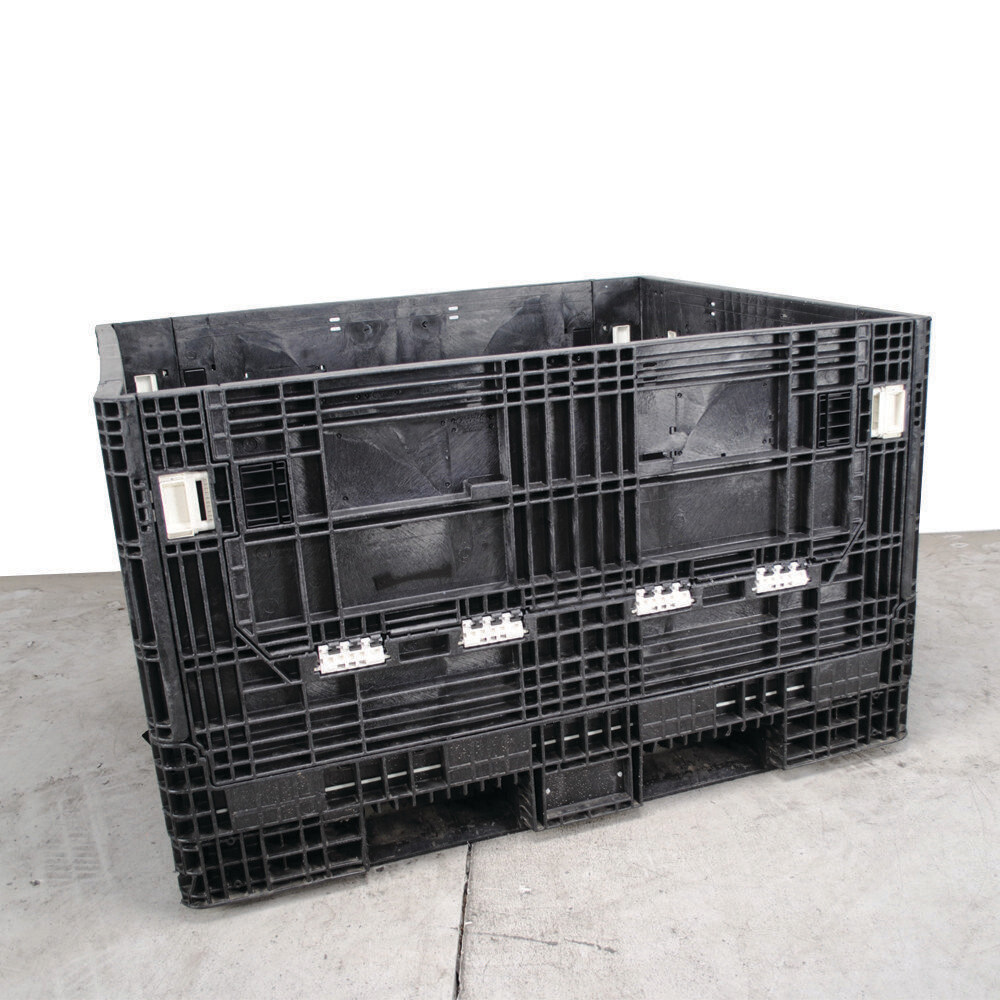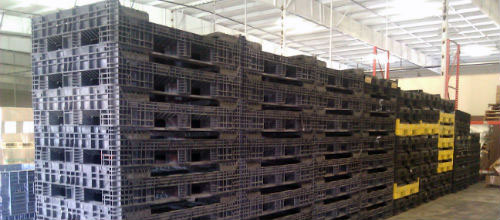Why Mass Containers Are Vital for Cost-efficient and sustainable Transportation
Mass containers play a crucial role in modern-day logistics. They assist in the efficient motion of big amounts of products, therefore optimizing transport procedures. This approach not just minimizes expenses however additionally decreases ecological influence with reduced discharges and waste generation. As markets seek even more lasting techniques, the adoption of mass containers is ending up being progressively significant. What effects does this shift hold for future logistics and supply chain administration?

The Benefits of Making Use Of Mass Containers in Logistics
Mass containers change logistics by enhancing effectiveness and sustainability. These containers permit the transport of big quantities of goods in a single trip, significantly minimizing the number of journeys required. This not only improves operations however likewise lessens labor expenses connected with handling, packing, and discharging. In addition, bulk containers are created to enhance area use within transport cars, making sure that more products can be shipped at the same time.
The standardization of bulk containers additionally simplifies the logistics process. With uniform measurements, they can be quickly stacked and stored, resulting in improved storehouse management. Bulk containers commonly feature resilient materials that secure components from damages during transportation, thus decreasing item loss and boosting overall integrity. Consequently, organizations can experience improved supply chain performance, eventually leading to boosted earnings and customer complete satisfaction. This mix of aspects makes mass containers a crucial possession in modern logistics.
Environmental Influence: Lowering Waste and Carbon Impact
As industries increasingly focus on sustainability, the adoption of mass containers has actually become a vital technique for lowering waste and reducing carbon impacts. These containers lessen using packaging products, such as boxes and plastic, consequently notably reducing total waste generation. By consolidating shipments, mass containers enhance transport efficiency, enabling for more items to be transported per journey. This reduction in trips straight correlates with reduced greenhouse gas emissions, adding to a smaller carbon footprint.
In addition, mass containers can frequently be reused or reused, better mitigating environmental effect. The durability of these containers guarantees they can endure several transportation cycles, lowering the requirement for single-use alternatives. used collapsible containers. By improving logistics and advertising reliable source usage, mass containers not only sustain sustainable techniques but additionally urge industries to straighten with worldwide ecological goals. Eventually, their implementation shows a dedication to eco-friendly stewardship and liable resource administration
Cost Savings: How Bulk Containers Lower Transportation Expenditures
While numerous companies seek means to improve their profits, the usage of mass containers presents a considerable opportunity for reducing transportation costs. Mass containers take full advantage of the quantity of items transferred, permitting organizations to ship bigger quantities at the same time. This effectiveness decreases the variety of journeys required, straight decreasing gas costs and minimizing labor expenditures connected with loading and unloading.
In addition, bulk containers typically feature streamlined layouts that enhance room use within transport lorries. This implies less empty spaces, bring about much more reliable use of readily available capability. In addition, the durability of bulk containers can decrease the danger of item damage during transportation, decreasing losses and making certain that more goods show up undamaged.
Enhancing Supply Chain Efficiency With Mass Storage Solutions
Bulk storage options play an essential role in improving supply chain effectiveness by enhancing supply management. By combining products right into less, larger containers, services can greatly decrease managing expenses related to frequent transfers and processing. This streamlined approach allows for better tracking and monitoring of stock, inevitably resulting in boosted functional performance.
Structured Inventory Management
Effective stock monitoring is vital for enhancing supply chain operations, especially when organizations embrace bulk storage solutions. These solutions enable companies to preserve higher stock levels while reducing the frequency of replenishment. By settling materials right into mass containers, companies can improve their supply procedures, minimizing the intricacy connected with tracking numerous smaller packages. This strategy promotes exact stock counts and enhances projecting precision, permitting more informed decision-making. Furthermore, mass storage remedies streamline storehouse organization, making it easier to situate and accessibility items when needed. As an outcome, organizations can accomplish an extra reliable stock turnover price, inevitably enhancing total supply chain efficiency and lowering the probability of stockouts or overstock scenarios.

Minimized Handling Costs
The application of mass storage services not just streamlines stock administration yet also substantially lowers taking care of costs across the supply chain. By combining materials into mass containers, companies reduce the requirement for constant handling and transfer in between various storage space and transportation systems. This technique lowers labor costs connected with loading, dumping, and relocating smaller sized plans. In addition, mass storage space lowers the regularity of deliveries, leading to lower transportation costs and decreased gas consumption. Therefore, companies can enhance their logistics operations, permitting a much more effective allowance of resources. Eventually, minimized managing expenses add to improved general supply chain performance, fostering a setting that supports both sustainability and financial practicality.

Convenience of Bulk Containers Across Numerous Industries
Many industries have unique demands for transport and storage space, mass containers have actually arised as a functional solution that meets a vast array of demands. These containers, varying from large containers to specialized tanks, can accommodate diverse materials, including granules, powders, and fluids. In the farming field, mass containers facilitate the transportation of grains and plant foods, while the food and drink market utilizes them for components and completed products. The chemical industry relies upon mass containers for securely moving unsafe products, making sure conformity with safety guidelines. Additionally, building firms take advantage of bulk containers for carrying aggregates and other materials. Their flexibility expands to various modes of transportation, consisting of trains, vehicles, and ships, improving logistical efficiency. This flexibility not only enhances operations across different industries but also advertises sustainability by minimizing packaging waste and optimizing room in transportation. Consequently, mass containers play a necessary function in modern supply chain management.
Future Trends wholesale Container Usage and Sustainability
The future of mass container usage is increasingly formed by innovative products advancement that enhances sustainability. Furthermore, automation in logistics promises to simplify operations, reducing waste and enhancing efficiency. Accepting round economic climate practices will certainly further reinvent how bulk containers are developed, utilized, and reused, cultivating an extra sustainable transportation landscape.
Innovative Products Development
As sectors increasingly prioritize sustainability, ingenious products development in bulk containers arises as a significant consider boosting green transport solutions. Researchers and suppliers are exploring naturally degradable plastics, recycled compounds, and light-weight steels to decrease ecological impact. These products not just decrease waste however likewise improve gas efficiency by decreasing the overall weight of containers. Additionally, improvements in wise products, which can adapt to varying conditions, boost the toughness and capability of mass containers. The combination of these ingenious materials aligns with round more info economy concepts, promoting reuse and recycling. As the demand for sustainable practices expands, the growth of such products will play an important role fit the future of mass container use in logistics and transport.
Automation in Logistics
Substantial innovations in automation are positioned to transform logistics and the usage of mass containers, improving sustainability in transportation. Automated systems, consisting of drones and independent vehicles, are improving the movement of mass containers, minimizing the reliance on traditional fuel-powered transportation. These innovations optimize routing and packing processes, lessening empty miles and improving gas efficiency. In addition, automated inventory management systems enhance monitoring and tracking of mass containers, ensuring far better source allotment and reduced waste. The integration of the Net of Things (IoT) allows real-time information evaluation, making it possible for aggressive decision-making that lines up with sustainability goals. As automation remains to progress, it is expected to drive further innovations wholesale container usage, ultimately sustaining more sustainable logistics practices and lowering the ecological impact of transport.
Circular Economic Situation Practices
Innovations in automation are setting the phase for a much more integrated strategy to circular economy techniques in the domain of mass container usage. As sectors progressively embrace sustainability, mass containers are being developed for long life and reusability. This shift not just minimizes waste yet likewise boosts resource performance. Companies are taking on techniques such as closed-loop systems, where made use of containers are collected, reconditioned, and reintroduced into the supply chain. Furthermore, clever innovations track container life process, assisting in much better administration and decreasing ecological effect. The partnership between suppliers, logistics service providers, and end-users is essential in establishing requirements for lasting container usage. used collapsible bulk containers. Future trends suggest a growing emphasis on materials that are recyclable and biodegradable, further strengthening the circular economy's concepts wholesale transport

Regularly Asked Inquiries
What Materials Are Mass Containers Typically Made From?
Mass containers are generally built from resilient materials such as high-density polyethylene, cardboard, light weight aluminum, and steel. These products provide convenience, protection, and strength, making them suitable for delivering numerous items in different markets effectively.
Exactly how Do I Pick the Right Dimension Mass Container?
Picking the ideal size bulk container involves assessing the volume of materials to be moved, taking into consideration handling equipment compatibility, and appraising storage room needs. Appropriate size guarantees efficiency in transport and decreases waste throughout shipment.
Are Bulk Containers Reusable or Recyclable?
Bulk containers are typically recyclable, developed for multiple journeys, improving sustainability. Numerous can also be reused, depending on the materials used. Picking recyclable options further supports environmental goals and reduces waste in transportation practices.
What Safety And Security Laws Apply to Mass Container Transportation?
Safety guidelines for bulk container transport include conformity with the Department of Transportation standards, proper labeling of unsafe materials, architectural stability assessments, and adherence to weight limits to assure risk-free handling and avoid accidents during transportation.
How Can Organizations Shift to Using Bulk Containers Properly?
Services can change to bulk containers by reviewing existing logistics, training personnel on handling, investing in appropriate tools, optimizing stock management, and working together with suppliers to assure compatibility and performance throughout the supply chain.
As industries progressively prioritize sustainability, the fostering of mass containers has actually arised as a vital strategy for lowering waste and lowering carbon footprints. By consolidating products into bulk containers, business can simplify their supply procedures, decreasing the complexity connected with tracking multiple smaller sized packages. As industries progressively prioritize sustainability, cutting-edge materials advancement in mass containers emerges as a considerable variable in enhancing green transport remedies. Automated systems, consisting of drones and autonomous vehicles, are improving the motion of bulk containers, decreasing the reliance on conventional fuel-powered transportation. Furthermore, automated stock administration systems improve tracking and monitoring of bulk containers, guaranteeing better resource allocation and lowered waste.